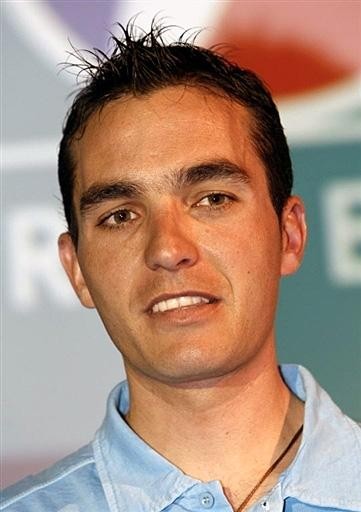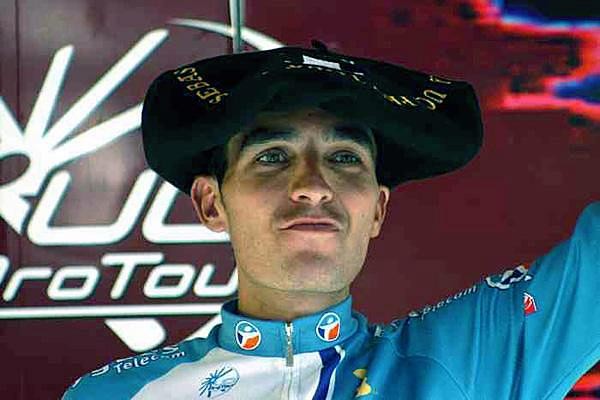Xavier Florencio: Ready for Amstel, Flèche and Liège
The Ardennes Classics are coming and Spain's Xavier Florencio, winner of the 2006 Clásica San...




An interview with Xavier Florencio, April 18, 2008
The Ardennes Classics are coming and Spain's Xavier Florencio, winner of the 2006 Clásica San Sebastián, is ready to show his ability to be among the top contenders. Like countrymen Juan Antonio Flecha and Oscar Freire, the 28 year-old of Team Bouygues Telecom is a Classics specialist riding for a non-Spanish team. Cyclingnews' Hernan Alvarez spoke with the well-mannered rider while he was in his hometown Tarragona, Spain.
After starting his year in Australia's Tour Down Under and Spain's Volta a la Comunidad Valenciana – where he finished third overall – a crash spoiled Xavier Florencio's ride in the Paris-Nice. "I didn't do very well because of a crash I had the previous week [in the Clasica de Almeria]," said Florencio with complete honesty, explaining his performance in the prestigious French race. "I hurt my hands because I wasn't using gloves, and with the temperature we had those days, my hands and my got knees infected. I didn't feel good until the last two days [of Paris-Nice].
"I was very fit and had been excited to start Paris-Nice. I couldn't finish the job in Vuelta a Valencia; I couldn't win one stage to finish the job. I took third place in the general [classification], second in one stage, two third places and the points classification, which makes me happy. The next day, in the Clasica de Almeria, I crashed and I lost hope for Paris-Nice. My goal and the team goal was Paris-Nice, and I think I showed I had very good condition in the Vuelta a Valencia ."
The one-day competition in Andalucía wasn't a good step for the Bouygues Telecom rider. "I couldn't finish Clasica de Almeria," he continued. "We rode Clasica de Almeria just to make the numbers – to gain some kilometres – and I was involved in a crash. It was a pity that I had to stay off the bike for four or five days. I went to Paris-Nice thinking that I would recover the good sensations and my hands would get better, but things went upside down. I didn't recover completely due to the rain and the bad weather there."
His first target – the 'Race to the Sun' – was unsuccessful. "My goal was Paris-Nice, but I couldn't fulfil it due to the crash," Florencio admitted. However, he is looking ahead to other targets. "I think I can do well in Vuelta al País Vasco [he finished eighth in one stage and 54th overall - ed.], thinking of the Amstel [Gold Race], Flèche Wallonne and Liège [-Bastogne-Liège], which are the goals I have marked.
"I will race these three competitions, all three at full effort in the hopes of obtaining a good result."
Get The Leadout Newsletter
The latest race content, interviews, features, reviews and expert buying guides, direct to your inbox!
Going abroad
Three-time World Champion Oscar Freire noted that the Classics specialists are not very respected in Spain. Asked about his opinion to these words, Florencio retorted, "I think that thanks to Oscar, starting when he won the first Worlds, it is clear that there are more [Spanish] riders who adapt themselves better to this kind of races – to the Classics.
Unfortunately for Spanish cycling or for the Spanish teams, most of the [Classics] riders are on foreign teams that truly appreciate the Classics and where they have a team at their service."
The Spanish devaluation of Spring Classics is currently decreasing according to Florencio. "Spanish fans like this type of cycling. However, so far the [Spanish] teams are not betting on these type of riders. But, little by little, I have noticed that all the teams have a clasicomano [a Classics specialist - ed.]. You can see that Caisse d'Epargne has two or three riders for the Classics; Saunier Duval also has two or three riders. This type of rider is becoming more and more better rated in Spain."
Nearly 200 riders usually compete in an elite professional race, and only a few have a chance at winning and only one actually does. How difficult is to win a race? "It's very difficult," he replied. "Apart from having optimal condition – training for three or four months for a race – you have to be lucky to avoid crashes and other things. It's very difficult to win. Once you are among the top four or five then maybe there it is luck which plays a role; also that everything is played out well during the race."
On target
"I arrange my own training sessions and my training group is made of two or three riders," Florencio explained of his training around his hometown. "Some time ago, one of my best friends and training partners was Isaac Gálvez, but, unfortunately, he died one year ago – I trained a lot with him. Now, I train with amateurs and when I have to train hard, I do it alone. The hardest part is in the winter, when you truly have to train hard by doing a lot of hours on the bike. However, during the season, it is just competing and resting, competing and resting – competition gives me the fitness."
Florencio reached his first peak performance heading into Paris-Nice, but he couldn't get the most out of that race and is looking to make up for it during the rest of the season. "Now, I want to have another one during the three [Ardennes] Classics and then I will rest as many days as possible to be ready for the Tour de France," he continued. "After the Tour, I will rest for a few weeks to face the final part of the season, the Vuelta a España and the Worlds – if I am selected to race it with the national team."